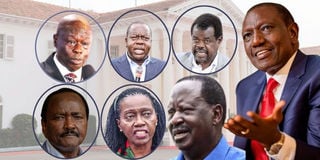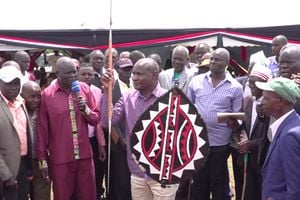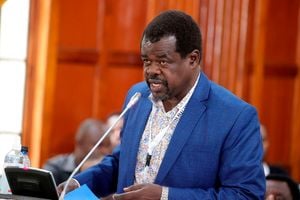
President William Ruto (right) and (Bottom row) Wiper leader Kalonzo Musyoka (left) Narc Kenya leader Martha Karua, ODM leader Raila Odinga. Top row from left: Former DP Rigathi Gachagua, former Interior CS Fred Matiang'i, and Busia Senator Okiya Omtatah.
Fresh battle lines have been drawn as both old and new political faces escalate their incursions, seeking new partners in early 2027 game plans targeting youths, who are projected to form the largest voting bloc.
In the 2022 polls, there were 8,811,691 registered voters aged between 18 and 34 years — constituting 40 per cent of the total electorate. By 2027, most of Generation Z (born between 1997 and 2012), who participated in the anti-tax protests that reshaped Kenya’s political and activist landscape, will have reached voting age, according to an analysis of the 2019 census data produced by the Kenya National Bureau of Statistics (KNBS).
The youth population, aged between 18 and 34 years, is projected to reach 17.8 million, underscoring the pivotal role they will play in determining how the country is governed after 2027. These figures have already triggered significant political realignments nearly three years before the next elections.
The integration of the Kamba community into the larger Gikuyu, Embu, Meru Association (Gema), following a push by former Deputy President Rigathi Gachagua and Wiper leader Kalonzo Musyoka, alongside Narc Kenya leader Martha Karua’s departure from the Azimio La Umoja Coalition in search of new partners, are among the key realignments reshaping the political landscape.
The three leaders have intensified efforts to appeal to the youth, with Ms Karua announcing plans to rebrand her party to align with Generation Z, who have traditionally been seen as apolitical.
Potential challenges
President William Ruto’s United Democratic Alliance (UDA) has launched an aggressive campaign targeting the youth, shifting focus to opposition leader Raila Odinga’s strongholds in Western and Nyanza. Analysts believe this could be part of a strategy to counter potential challenges in the politically significant Mount Kenya region. UDA’s youth-focused initiative, Comrades Chapter, has been traversing the country in a bid to connect with and mobilise the youth.
“Comrades Chapter is an initiative by the party to reach out to the youth across the country. We engage them to hear their views and suggestions on how the government can address their needs,” UDA National Youth Leader Cedrick Otieno told Nation.
Busia Senator Okiya Omtatah, a political newcomer, has pulled a surprise by forming a 10-member presidential exploratory committee to assess his chances of contesting the presidency in 2027.
Although he has not publicly declared his interest, former powerful Interior Cabinet Secretary Fred Matiang’i has taken a significant step by signing an agreement on 29 July 2024 with Canadian lobbying firm Dickens & Madson to bolster his prospects of vying for the presidency. Matiang’i is among individuals admired by Generation Z voters for his reforms in the education sector.
In the last election, the competition was between the Kenya Kwanza Alliance, led by Dr Ruto’s UDA, and Azimio La Umoja, led by Mr Odinga’s Orange Democratic Movement (ODM). Dr Ruto narrowly won, securing 7.18 million votes (50.49 per cent) to Mr Odinga’s 6.94 million votes (48.9 per cent). Data from the Independent Electoral and Boundaries Commission (IEBC) shows Dr Ruto garnered 2.94 million votes from the ten Mount Kenya counties and 1.6 million votes from the seven North Rift counties. Mr Odinga managed 847,709 votes from Mount Kenya and close to one million votes from Mr Musyoka’s counties of Kitui, Machakos, and Makueni.
Currently, Dr Ruto and Mr Odinga are in a broad-based government, with their allies exploring a possible partnership in the next election. However, their collaboration could face challenges due to a projected deficit of close to five million votes from Mount Kenya and Ukambani, following Dr Ruto’s fallout with Mr Gachagua and Mr Odinga’s strained relations with Mr Musyoka.
During his impeachment, Mr Musyoka rallied his members to vote against it, and he is now seen as an ally of Mr Gachagua. Political violence broke out last week at a funeral in Limuru, forcing Mr Gachagua to flee. He blamed unnamed government figures for allegedly orchestrating an attempt to harm him.
“The hired goons were after me. I was lucky I was not hit. This is a desperate scheme by those we have issues within 2027 to intimidate me from engaging my people, having a dialogue with Kenyans, and participating in efforts to redeem this country,” said Mr Gachagua.
On Wednesday, the Kikuyu Council of Elders formally integrated the Kamba community into Gema during an event held at All Saints’ Cathedral in Nairobi. While Mr Musyoka and Mr Gachagua were absent, their allies said they had endorsed the move.
“The Kamba community has formally been admitted into Gema. We are now part of the mountain in all major decisions. The Ukambani counties of Kitui, Makueni, and Machakos now constitute the Mount Kenya South region. This is a turning point in the socioeconomic and political consciousness of Kenya as we know it,” said Kitui Senator Enoch Wambua.
Historically, Gema has been a controversial entity, with critics perceiving it as a tool to stir ethnic emotions for electoral purposes. Upon assuming office in 1978, President Daniel Moi banned tribal organisations from neutralising GEMA’s political activities.
“It has been far too long since we last connected with our brothers from Kamba. There is nothing more valuable than reuniting with family after such a long time. Our home is defined by the elders, and it is our duty to safeguard it,” said Kikuyu Council of Elders Chairman Wachira Kiago.
Kamba integration
Mr Musyoka views the Kamba integration as a major boost, enabling him to exploit the dissatisfaction with Dr Ruto in Mount Kenya. He also hopes to leverage a provision barring Mr Gachagua from running for office following his impeachment. However, Mr Gachagua retains the option to challenge his removal in court.
Mr Musyoka, who turns 71 on 24 December, has vowed not to support any other presidential candidate.
“Giving up my presidential ambition would actually mean I go home. It is as simple as that. What it means is that giving up my presidential ambition is not an option. That is basically what I am telling you,” said Mr Musyoka, in a previous interview with Nation.
Senator Omtatah, another presidential hopeful, opposes the reliance on ethnic blocs, advocating instead for governance that addresses citizens’ needs.
“Ethnic balkanisation has historically been linked to post-election violence. Kenya urgently needs leadership that respects the sovereignty of its people,” he told Nation.
Professor David Monda, a US-based academic, noted that Mr Omtatah’s candidacy could provide an alternative to entrenched ethnic voting patterns. However, he acknowledged the uphill task of shifting Kenya’s political culture, where voters remain deeply rooted in identity politics.
“He’s not from one of the major ethnic constituencies that are antagonistic towards each other (Mt Kenya (Gema), Luo Nyanza, or Kalenjin). A small Busia luhya sub-ethnic constituency is non-threatening. So his bid is less polarizing and allows for different players to coalesce around his presidential bid,” says Prof Monda.
An uphill task
He described him as an outsider looking in, noting that it would be an uphill task for him to change the country’s political behaviour where voters elect people from their ethnic blocs.
“Omtatah might have the best policies and be corruption-free, but identity politics and ethnic mobilization still sway a large part of the Kenyan electorate. In the broad picture, this is an exploratory team he is launching which could also indicate this as a bargaining tool targeting rival candidates in the opposition and malcontents in the government, to consider Omtatah as a partner going into the 2027 elections. He offers many positives to any political player,” he observes.
Ms Karua, who served as Mr Odinga’s running mate in 2022, has also sought new alliances following Narc Kenya’s exit from Azimio. She is rebranding her party, introducing term limits for its leadership, and aligning with younger voters to chart a new path for Kenya’s political future.
“When Azimio’s purpose changed, through its leadership who are also the majority in the coalition (ODM) Narc Kenya deliberated and made a decision to exit,” Ms Karua said at the convention.
She pointed out that the 90-day notice given to the Registrar of Political Parties in July has since elapsed “and with the delegates' approval, we want to move on record that we are no longer in the Azimio coalition.”
“Narc Kenya is rebranding and changing its name and party colours and the NDC today (Thursday) has given the National Executive permission to go ahead with the rebranding exercise. They have also given us permission to amend our constitution and we wish to be the first party in Kenya to have term limits for the top leadership of the party,” said Ms Karua.












